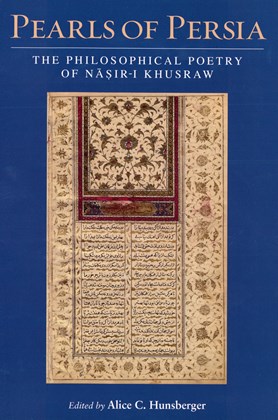Pearls of Persia The Philosophical Poetry of Nāṣir-i Khusraw
I.B. Tauris in association with the Institute of Ismaili Studies
Nāṣir-i Khusraw was a major figure in medieval Persian culture. This Muslim philosopher, poet, traveller and Ismaili dāʿī, who lived a thousand years ago in the lands today known as Afghanistan, Iran and Tajikistan, is consistently ranked by Persian speakers as one of the finest poets in their language. Yet, in the West, where he is known largely for his Safar-nāma (travelogue), describing his seven-year journey from Khurāsān, in the eastern Islamic lands, to Cairo, the city of the Fatimid caliph-imams, his poetry and ideas are less familiar. Even among those who know the poet’s work, few understand the concepts he expounds, as the genre of philosophical poetry in Persian remains mostly unexplored. As the first Western study of Persian philosophical poetry, this volume seeks to redress the balance.
Written by authorities on Nāṣir-i Khusraw and Persian literature, and originally presented as papers at a conference at SOAS, University of London, the chapters here cover topics ranging from metaphysics, cosmology and ontology, to prophecy, rhythm and structure, the analysis of individual poems and the matter of authorship. Rigorous literary analysis of several complete major poems advances the field of Persian Studies beyond investigating what a poem means to how it is constructed and how poetic technique and philosophy can be combined to create masterpieces. This volume therefore represents the initiation of important studies in the genre of Persian philosophical poetry.
Editor’s Introduction: Nāṣir-i Khusraw and Philosophical Poetry
Alice C. Hunsberger
I. Speech and Intellect
1. The Position of ʿAql in the Prose and Poetry of Nāṣir-i Khusraw
Faquir Muhammad Hunzai
2. Ontological and Religious Aspects of the Intellect in Nāṣir-i Khusraw’s Poetry
M. J. Esmaeili
3. ‘I Am a Mine of Golden Speech’: Poetic Language and Self-Reference in Nāṣir-i Khusraw’s Qaṣīdas
Daniel Rafinejad
4. Nāṣir-i Khusraw’s Ode to the Universal Soul and Intellect
Leonard Lewisohn
II. Philosophical Poetry: Enlightening the Soul
5. Nāṣir-i Khusraw, Imagination, Prophecy and the Poetics of Enlightenment
Mohammad Azadpur
6. Nāṣir-i Khusraw’s Poetics of the Moral Journey and the Foundations of the Metaphysics of Morals
Mehdi Aminrazavi
7. The Rawshanāʾī-nāma and the Older Iranian Cosmogony
Mohsen Zakeri
III. Nāṣir-i Khusraw’s Poetics
8. Also a Poet
Michael Beard
9. Hearing by Way of Seeing: Zabān-i ḥāl in Nāṣir-i Khusraw’s Poetry and the Question of Authorship of the Rawshanāʾī-nāma
Nasrollah Pourjavady
10. ‘On the Steed of Speech’: A Philosophical Poem by Nāṣir-i Khusraw
Alice C. Hunsberger
11. Symbolic Structure in a Poem by Nāṣir-i Khusraw
Julie Scott Meisami
12. Rhythm in Nāṣir-i Khusraw’s Poems
Finn Thiesen
13. Nāṣir-i Khusraw: A Poet Lost in Thought?
Julie Scott Meisami
Appendix: Three Qaṣīdas in the Persian script
Bibliography
Index
Alice C. Hunsberger received her PhD in Islamic and Persian studies from Columbia University. She has written and lectured extensively on Nāṣir-i Khusraw, and is the author of the acclaimed biography Nasir Khusraw, The Ruby of Badakhshan: A Portrait of the Persian Poet, Traveller and Philosopher (2000), which has been translated into Persian, Tajik, Russian and Arabic. A former Research Fellow at The Institute of Ismaili Studies, London, Dr Hunsberger currently lectures on Islam and Sufism at the City University of New York, Hunter College, where she has twice won the First Prize President LeClerc Award for Excellence in Teaching.

